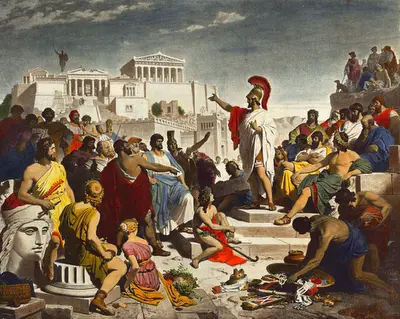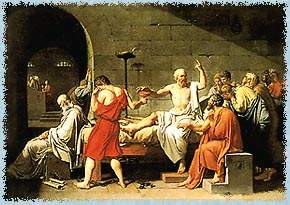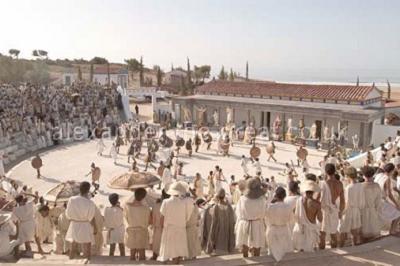Ancient Greek Democracy: Around the year 1000 BC in the area in which current Greece is situated today, after a long and hard battle the very first city-state had started to rise. Hence this resulted in the division of Greece into the Achaian part which was Arcadia, the Doric part which was Sparta and finally the Ionic part which was Attica.
Among these three cultures, the one which had the lowest status was Sparta even though if we look at Sparta from a military point of view it was the one which excelled. The Achaians, as well as the Ionians, had owed their entire independence to the inaccessible mountainous terrains but in battle, they would always be beaten by the primitive Spartans.
But then a group of Ionians survived and thanks to that the world had gotten the opportunity to know of a special system of government called the ancient Ancient Greek Democracy.

Government in Ancient Greece
Ancient Greece, right from the time of the Mycenaeans were ruled by a set of aristocrats who monopolized political power, with the masses having no say over it.
Over time in some states like Sparta, a monarchy system grew up but was very rare and it was mostly an aristocratic form of government in most ancient Greek city-states.
But with the corrupt practices of the aristocrats, people were frustrated with this system, leading to the rise of tyrants. These were mostly aristocrats themselves and sometimes military generals who overthrew the rule of the aristocracy with the people’s support to control the political system themselves.
But over time people came to know the downsides of tyranny and wanted a share in the political process which led to the coming of a system of direct rule of the masses known as democracy.
What was democracy like in Ancient Greece?
Ancient Greek democracy was a system of direct democracy in which the people present in the assembly took the decision directly instead of having any representative to vote. The people rotated on a random basis and took part in the popular assemblies where proposals were submitted and the people voted.
Rise of democracy
The cradle of Ancient Greek Democracy was Athens, which was the Greek city-state situated in Peloponnese which was in Attica. Athens had owed the very first penal as well as civil law code to Draco. It was he who had differentiated the premeditated murder from the accidental manslaughter.

People became angry with the harsh set of laws framed by Draco and the Draconian is still used as a term to define autocracy. So at this moment when popular uprisings could have been a possibility, Solon made several reforms to alleviate the grievance of the people. These reforms also have people the right to participate in assembly meetings and are considered to be the foundation of Athenian democracy.
But this was overruled soon after his death but around 508 BC, Cleisthenes again reformed the constitution to break the aristocratic monopoly of political power and included the common citizen’s right to rule the city and he is considered to be the ‘father of Athenian democracy.

In around 510 BC Cleisthenes introduced abysmal reforms which had made democracy exist for the very first time as a system of government. The ideas of Cleisthenes reforms were the following:
1. Replacement of the division into the various tribe, fraternities as well as families with territorial division too.
2. Division of the Attica into three very distinct districts and the districts to be divided into smaller areas.
3. Citizens’ right for the foreigners who were living in Attica.
4. Replacement of the Council of Solon of 400 people with that of 500 and also the introduction of ostracism as well as Board generals.
Athenian Democracy
The word democracy comes from the Greek word, demos meaning people and Kratos which means power and hence the world literally means that the power of the people. Athenian Ancient Greece Democracy had been established actually as a result of the continuous reorganizations.
It remains a unique and intriguing experiment in direct democracy where the people do not elect representatives to vote on their behalf but vote on legislation and executive bills in their own right.
Participation was by no means open, but the in-group of participants was constituted with no reference to economic class and they participated on a scale that was truly phenomenal. The public opinion of voters was remarkably influenced by the political satire performed by the comic poets at the theatres.
Solon (594 BC), Cleisthenes (508/7 BC), and Ephialtes (462 BC) all contributed to the development of Ancient Greek Athenian Democracy. Historians differ on which of them was responsible for which institution, and which of them most represented a truly democratic movement.
It is most usual to date Athenian democracy from Cleisthenes since Solon’s constitution fell and was replaced by the tyranny of Peisistratus, whereas Ephialtes revised Cleisthenes’ constitution relatively peacefully. Hipparchus, the brother of the tyrant Hippias, was killed by Harmodius and Aristogeiton, who was subsequently honored by the Athenians for their alleged restoration of Athenian freedom.
The greatest and longest lasting democratic leader was Pericles; after his death, Athenian democracy was twice briefly interrupted by oligarchic revolution towards the end of the Peloponnesian War.
It was modified somewhat after it was restored under Eucleides; the most detailed accounts are of this fourth-century modification rather than the Periclean system. It was suppressed by the Macedonians in 322 BC. The Athenian institutions were later revived, but the extent of which they were a real democracy is debatable.
Was Athens the only democracy in ancient Greece?
Athens was the most prominent, stable and prosperous of the Greek democracies. Even some scholars consider Sparta to be the first democracy with a written constitution. Although Athens was the only state proclaiming itself a democracy but there were other regimes who had democratic institutions like the Spartan Lower house under the elders which represented the people and even included the women and was established even before Athen’s Democracy. Even states like Argos, Magera,etc had certain democratic councils.
Facts about Ancient Greek Democracy
- Ancient Greek democracy was a direct democracy with no representatives but people directly voting for or against proposals.
- Only free male citizens could vote and take part in the assemblies as women and slaves were not allowed to have a vote.
-
It did not have formal rules for speaking in the assembly. So anyone can speak at any time which made oratory skills very important to hold the attention of the people.
- The votes were counted by plain sight or even by judging the loudest noise made for or against the proposals.
How was Athenian Democracy different from modern democracy?
Athens is considered to be the first democracy by many and was the general inspiration for modern peoples’ representative democracies. But ancient Athenian democracy was very different from the system we know today. Many scholars have even questioned it being called a democracy and many considered it to be a form of oligarchy.
The identity of being a citizen was completely different from today as only ethnic Athenians or ones born from both Athenian parents were considered citizens while others were considered to be foreigners naturally excluding them from voting.
The form of democracy in Athens was directly from the people, and elections to the assembly were conducted unlike in modern times. All Male citizens could take part and be sometimes randomly picked out for attending the assembly.
How is ancient Greece democracy similar to democracy in the united states?
Although the ancient Greek democracy is fundamentally different from the modern democracies, it has definitely left a mark on modern democracies, especially the USA.
Its founders were greatly influenced by ancient Athenian democracy and we can find a lot of similarities between the two.
After its independence, the USA established the rule of law in which they prepared strict adherence to the laws which are to be enforced equally and judged independently but all adhere to the international human rights ethics. Similarly, we find the Greek state being ruled by a set of laws and the famous Greek philosopher, Aristotle believing in the natural law, to which people should align themselves to and it should be governed by ethics.
The ancient Greek democracies had a written set of rules and laws in the constitution which guided the people on how to govern the state, which highly influenced the Americans to frame a written constitution after its founding.
The fundamental principles of voting to decide the policies have left a permanent mark on modern democracies, especially the USA. Although it is a form of voting, many of its themes and basis are still the same continuing to influence modern democracies.
Fall of Democracy
Democracy was weakened by continuous wars and ravaging, especially the Peloponnesian war. There was a continuous want for quick decisions in a war situation, with democratic decisions through discussions and voting taking time. Even famous intellectuals like Socrates continuously attacked it as ‘mobocracy’ or ‘Tyranny of the Masses’.